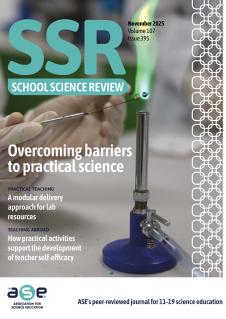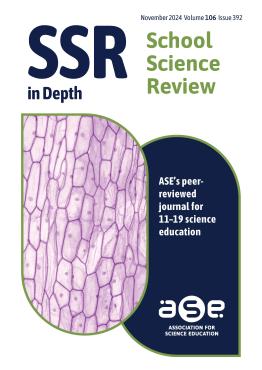School Science Review 395 Overcoming barriers to practical science
Issue 395 | Published November 2025

Overview
In this special issue of School Science Review, educators across the sector share ideas and techniques to help overcome some of the barriers to the implementation of successful practical science lessons.
Susie d’Espagnac shares evidence-based strategies to help prepare student teachers in embedding routines into practical science lessons, while Alex Lathbridge discusses how the use of practical investigation videos can support student learning in various ways.
Science technician Nina Ng shares examples of adaptations made to physics practicals to support students with special educational needs and disabilities, and Jane Oldham discusses a technician-led approach to resource delivery for experiments that results in improved practical lesson logistics.
Colleen Reid discusses the relationship between teacher confidence and the frequency and effectiveness of practical work in classrooms, noting that lower levels of confidence are associated with fewer student-led activities and greater use of demonstrations.
Also, in a thought-provoking article, Ian Abrahams and Nik Fotou share their perspectives on possible barriers to the effective use of practical work. This article draws on a wealth of sources and introduces a range of factors that could be considered when thinking about how to make practical work more effective.
The use of AI/Generative AI is topical at the present time and is a rapidly developing area. In this issue, we have a couple of articles focusing on the use of AI/Gen AI in teaching. Henry Ward outlines how he used ChatGPT to create resources to support scientific literacy. Victoria Hedlund explores gender equity in GenAI science explanations and the implications that this can have for teachers who are using AI tools to support their teaching.



